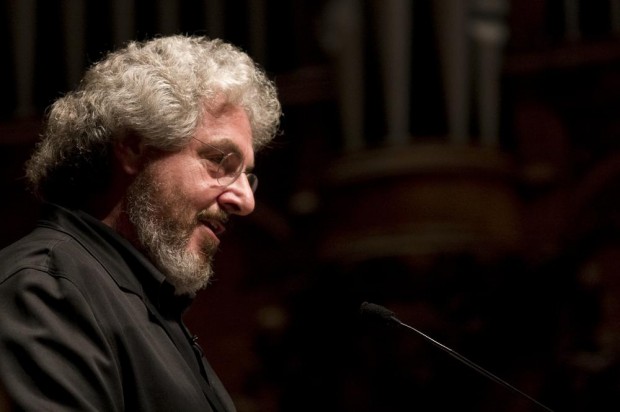Film | News
Remembering Harold Ramis
Harold Ramis speaks at Graham Chapel in September 2009. Ramis, an alumnus of Washington University, died of complications from autoimmune inflammatory vasculitis Feb. 24.
“I made a strong commitment to fun. I thought more than anything, I want to enjoy myself. And that just took me down certain paths and avenues and maybe even alleys that I shouldn’t have gone down. But it also freed me up to pursue mirth, just for its own sake.”
An actor, writer and director best known for his work on cult classics such as “Animal House,” “Groundhog Day” and the “Ghostbusters” films, Washington University alumnus and former trustee Harold Ramis died Monday.
Ramis, who graduated from the University in 1966, was 69 and leaves behind an incredible comedic legacy. He died of complications from autoimmune inflammatory vasculitis at his home in Chicago, where he grew up.
He was a member of the University’s chapter of Zeta Beta Tau fraternity while a student, and his experiences in the fraternity have often been said to be an inspiration for his screenplay for “Animal House.”
“The way we wrote the movie [“Animal House”] was we spent three months, eight hours a day, literally, in a office in Manhattan just debriefing ourselves totally on college,” Ramis told Student Life in a 2009 interview. “Every story we could remember, every interesting person we met, every funny thing that happened.”
“We think that we as a fraternity have always embodied the sense of humor and free-spirited nature that Ramis had and exhibited in his films,” the University’s ZBT chapter president, junior Sam Shapiro, said. “We’re proud that he came from our fraternity…not because he was successful but just the nature of his sense of humor and the type of work he did.”
The fraternity plans to honor its alumnus with a memorial service and party this weekend.
“It’s what Harold would’ve wanted,” Shapiro said.
Ramis’ relationship with the University continued far past his graduation. He sat on the school’s board of trustees from 1997 to 2005, and he returned to campus once again in 2009 as an Assembly Series speaker.
Ramis also visited the University in 1982 for Homecoming, Shapiro said. The fraternity honored him by finding a working car in a junkyard and constructing a full-scale model of the Deathmobile from “Animal House.” Afterward, Shapiro said, Ramis celebrated with fraternity members.
“I made a strong commitment to fun. I thought more than anything, I want to enjoy myself,” Ramis said in his Student Life interview. “And that just took me down certain paths and avenues and maybe even alleys that I shouldn’t have gone down. But it also freed me up to pursue mirth, just for its own sake.”
Henry Schvey, professor of drama and comparative literature, knew Ramis for more than 20 years and remembers Ramis as a surprisingly sensitive intellectual beneath his “geeky” outward persona.
“His brilliant mind and anarchic wit were miraculously combined with a strange sense of serene steadiness which inspired trust in even the most extreme personalities,” he told Student Life in a statement. “Dead at 69, it’s a terrible shock.”
“The loss of this great artist is both personal and public…my family and I will deeply miss him,” he added. “He combined great talent with a genuine care for others.”

